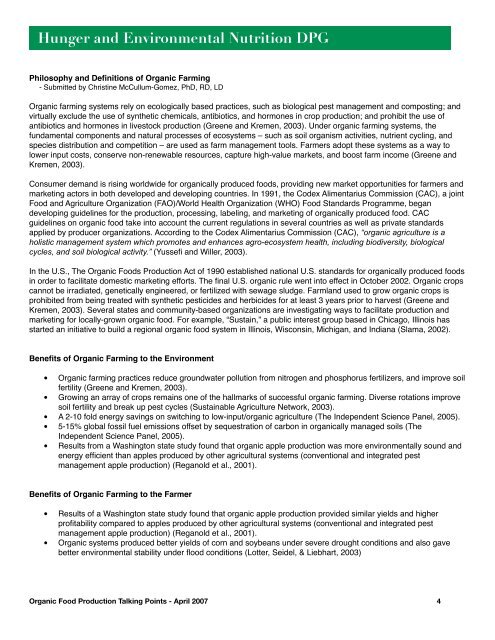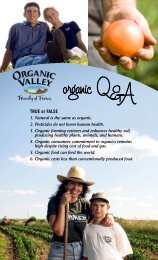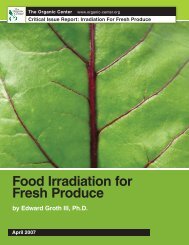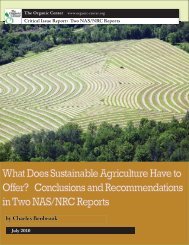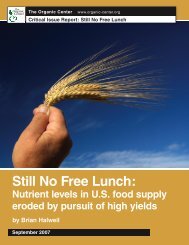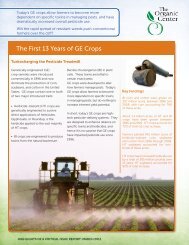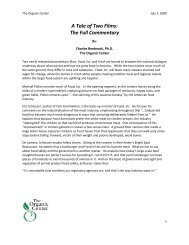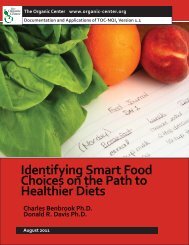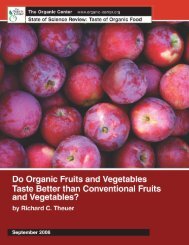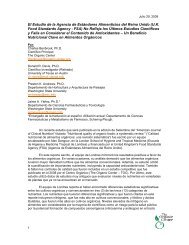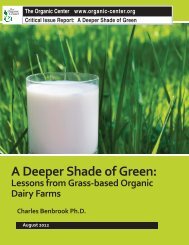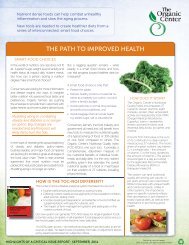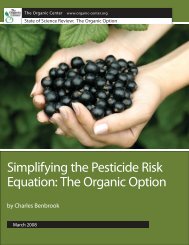Organic Food Production Talking Points - Hunger and ...
Organic Food Production Talking Points - Hunger and ...
Organic Food Production Talking Points - Hunger and ...
Create successful ePaper yourself
Turn your PDF publications into a flip-book with our unique Google optimized e-Paper software.
<strong>Hunger</strong> <strong>and</strong> Environmental Nutrition DPG<br />
Philosophy <strong>and</strong> Definitions of <strong>Organic</strong> Farming<br />
- Submitted by Christine McCullum-Gomez, PhD, RD, LD<br />
<strong>Organic</strong> farming systems rely on ecologically based practices, such as biological pest management <strong>and</strong> composting; <strong>and</strong><br />
virtually exclude the use of synthetic chemicals, antibiotics, <strong>and</strong> hormones in crop production; <strong>and</strong> prohibit the use of<br />
antibiotics <strong>and</strong> hormones in livestock production (Greene <strong>and</strong> Kremen, 2003). Under organic farming systems, the<br />
fundamental components <strong>and</strong> natural processes of ecosystems – such as soil organism activities, nutrient cycling, <strong>and</strong><br />
species distribution <strong>and</strong> competition – are used as farm management tools. Farmers adopt these systems as a way to<br />
lower input costs, conserve non-renewable resources, capture high-value markets, <strong>and</strong> boost farm income (Greene <strong>and</strong><br />
Kremen, 2003).<br />
Consumer dem<strong>and</strong> is rising worldwide for organically produced foods, providing new market opportunities for farmers <strong>and</strong><br />
marketing actors in both developed <strong>and</strong> developing countries. In 1991, the Codex Alimentarius Commission (CAC), a joint<br />
<strong>Food</strong> <strong>and</strong> Agriculture Organization (FAO)/World Health Organization (WHO) <strong>Food</strong> St<strong>and</strong>ards Programme, began<br />
developing guidelines for the production, processing, labeling, <strong>and</strong> marketing of organically produced food. CAC<br />
guidelines on organic food take into account the current regulations in several countries as well as private st<strong>and</strong>ards<br />
applied by producer organizations. According to the Codex Alimentarius Commission (CAC), “organic agriculture is a<br />
holistic management system which promotes <strong>and</strong> enhances agro-ecosystem health, including biodiversity, biological<br />
cycles, <strong>and</strong> soil biological activity.” (Yussefi <strong>and</strong> Willer, 2003).<br />
In the U.S., The <strong>Organic</strong> <strong>Food</strong>s <strong>Production</strong> Act of 1990 established national U.S. st<strong>and</strong>ards for organically produced foods<br />
in order to facilitate domestic marketing efforts. The final U.S. organic rule went into effect in October 2002. <strong>Organic</strong> crops<br />
cannot be irradiated, genetically engineered, or fertilized with sewage sludge. Farml<strong>and</strong> used to grow organic crops is<br />
prohibited from being treated with synthetic pesticides <strong>and</strong> herbicides for at least 3 years prior to harvest (Greene <strong>and</strong><br />
Kremen, 2003). Several states <strong>and</strong> community-based organizations are investigating ways to facilitate production <strong>and</strong><br />
marketing for locally-grown organic food. For example, “Sustain,” a public interest group based in Chicago, Illinois has<br />
started an initiative to build a regional organic food system in Illinois, Wisconsin, Michigan, <strong>and</strong> Indiana (Slama, 2002).<br />
Benefits of <strong>Organic</strong> Farming to the Environment<br />
• <strong>Organic</strong> farming practices reduce groundwater pollution from nitrogen <strong>and</strong> phosphorus fertilizers, <strong>and</strong> improve soil<br />
fertility (Greene <strong>and</strong> Kremen, 2003).<br />
• Growing an array of crops remains one of the hallmarks of successful organic farming. Diverse rotations improve<br />
soil fertility <strong>and</strong> break up pest cycles (Sustainable Agriculture Network, 2003).<br />
• A 2-10 fold energy savings on switching to low-input/organic agriculture (The Independent Science Panel, 2005).<br />
• 5-15% global fossil fuel emissions offset by sequestration of carbon in organically managed soils (The<br />
Independent Science Panel, 2005).<br />
• Results from a Washington state study found that organic apple production was more environmentally sound <strong>and</strong><br />
energy efficient than apples produced by other agricultural systems (conventional <strong>and</strong> integrated pest<br />
management apple production) (Reganold et al., 2001).<br />
Benefits of <strong>Organic</strong> Farming to the Farmer<br />
• Results of a Washington state study found that organic apple production provided similar yields <strong>and</strong> higher<br />
profitability compared to apples produced by other agricultural systems (conventional <strong>and</strong> integrated pest<br />
management apple production) (Reganold et al., 2001).<br />
• <strong>Organic</strong> systems produced better yields of corn <strong>and</strong> soybeans under severe drought conditions <strong>and</strong> also gave<br />
better environmental stability under flood conditions (Lotter, Seidel, & Liebhart, 2003)<br />
<strong>Organic</strong> <strong>Food</strong> <strong>Production</strong> <strong>Talking</strong> <strong>Points</strong> - April 2007! ! ! 4


